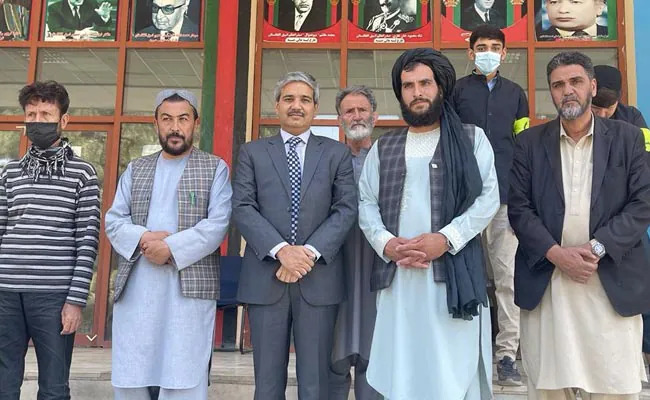
India has taken concrete steps with the Taliban regime as the latest diplomatic mission headed by J.P. Singh, senior diplomat in charge of Afghanistan in India’s external affairs ministry met Taliban “Foreign Minister” Amir Khan Muttaqi last week and focused on reviving trade and people-to-people links.
In his talks, Mr Singh, a veteran diplomat with first-hand experience of dealing with Afghanistan, discussed New Delhi’s humanitarian assistance to Afghans and the use of Chabahar port by Afghan traders.
The delegation also met former president Hamid Karzai, United Nations Assistance Mission in Afghanistan officials, and members of the Afghan business community.
“The delegation held discussions on India’s humanitarian assistance to the people of Afghanistan and also discussed the use of the Chabahar Port by Afghan traders,” said Randhir Jaiswal, the spokesperson of India’s external affairs ministry. “India has historical and civilizational ties with the Afghan people, and these long-standing linkages will continue to guide our approach,” he added.
India has not recognized the Taliban regime in Afghanistan and has been pushing for an inclusive government there. Significantly, India’s official statements did not refer to Muttaqi as a ‘foreign minister’ and Indian presence in Afghanistan is limited to its ‘technical mission’ in Kabul focused on humanitarian efforts.
The latest visit by Mr Singh signals India’s willingness to engage with the Taliban regime to protect its vital strategic and economic interests in that country. Given Afghanistan’s strategic location and its crucial geopolitical importance for New Delhi, not engaging with the Taliban regime is not an option for New Delhi, said Manish Chand, CEO, India Writes Network and Centre for Global India Insights, a think tank that closely tracks India’s diplomatic engagements. China’s recognition of the Taliban has made engaging with the Taliban, albeit in a limited manner, a strategic necessity for India, he said.
This engagement is necessary for India’s interest in the region and for the betterment of the Afghan people. This engagement is not unique to India, the US still engages with the Taliban to “ensure that stay committed to their anti-terror pledges.”
India has crucial interests in Afghanistan. It has invested significantly in infrastructure there including dams, schools and roads. The most important project is the Chabahar Port, which offers India a bypass route into Central Asia, completely eliminating dependence on Pakistan.
The current Taliban regime also seems to be at loggerheads with Islamabad and more optimistic towards India, presenting an opportunity for India to prevent Afghanistan from falling into the China-Pakistan nexus. “We Aren’t Anti-India and Pro-Pakistan,” said Suhail Shahid, Taliban’s veteran leader, in a recent interview.
(Deepakshi Bhardwaj contributed inputs for this article)
Author Profile
- India Writes Network (www.indiawrites.org) is an emerging think tank and a media-publishing company focused on international affairs & the India Story. Centre for Global India Insights is the research arm of India Writes Network. To subscribe to India and the World, write to editor@indiawrites.org. A venture of TGII Media Private Limited, a leading media, publishing and consultancy company, IWN has carved a niche for balanced and exhaustive reporting and analysis of international affairs. Eminent personalities, politicians, diplomats, authors, strategy gurus and news-makers have contributed to India Writes Network, as also “India and the World,” a magazine focused on global affairs.
Latest entries
 DiplomacyJanuary 5, 2026India walks diplomatic tightrope over US operation in Venezuela
DiplomacyJanuary 5, 2026India walks diplomatic tightrope over US operation in Venezuela India and the WorldNovember 26, 2025G20@20: Africa’s Moment – The Once and Future World Order
India and the WorldNovember 26, 2025G20@20: Africa’s Moment – The Once and Future World Order DiplomacyOctober 4, 2025UNGA Resolution 2758 Must Not Be Distorted, One-China Principle Brooks No Challenge
DiplomacyOctober 4, 2025UNGA Resolution 2758 Must Not Be Distorted, One-China Principle Brooks No Challenge India and the WorldJuly 26, 2025MPs, diplomats laud Operation Sindoor, call for national unity to combat Pakistan-sponsored terror
India and the WorldJuly 26, 2025MPs, diplomats laud Operation Sindoor, call for national unity to combat Pakistan-sponsored terror







